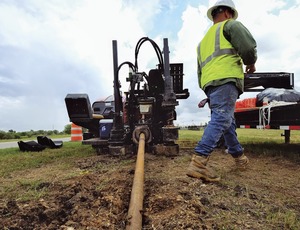
Google Fiber contractors are laying thousands of miles of cable in Austin, Texas, to support the broadband company's second major gigabit build-out. Customers there will start to sign up for the ultra-fast internet service in early December. Meanwhile, AT&T is busy preparing contractors in Cupertino, Calif., for what will be the first community in Silicon Valley to get U-verse with GigaPower 1Gbps broadband service.
Dozens of these projects have created an unprecedented period of gigabit network construction across the U.S. and Canada. In Kansas City, Mo., Google is wrapping up the first phase of its gigabit project after more than four years of development and construction.
With more than 1,000 new jobs to fill, union benches for electricians and linemen were empty during construction, says Rick Usher, Kansas City assistant city manager. "Kansas City Power & Light, with 80,000 light poles throughout the city, got a major upgrade to its network," he explains. "Contractors replaced 10% of those pole stocks, which was a major job in itself. Along with all the boring and trenching that was necessary to lay the fiber, we had contractors here from 17 states and two or three foreign countries."
In Austin, journeymen with the International Brotherhood of Electrical Workers are preparing for fiber work with continuing education. "We haven't seen that type of activity yet, and we haven't really handled a lot of fiber in Austin," says Chris Wagner, chief of Local 533. "But I know an IBEW chapter in Tulsa [that] had its books cleared by fiber projects."
Consumer demand for gigabit speed is staggering. Roughly 1,100 cities competed with Kansas City, Kan., to be Google's pilot test site, which quickly spread across the state line to Missouri and neighboring suburbs. "We expedited the permitting process," Usher says. "Our regulatory burden was much lower than it is on the East Coast or West Coast."
Google says it is asking cities to make sure they have permit processes suitable for a project of this scale, as any company building a large fiber network needs to submit thousands of construction permits. "Many cities have small permitting offices that might not be prepared for that volume of paperwork," Google Fiber says in its online blog.
As the scale was a bit overwhelming for Kansas City's own public-works inspectors, Black & Veatch acted as the city's quality-control engineer, performing site investigations and permit closeouts. Florida-based Mastec is believed to be the primary contractor for the build-out in Austin. The company has secured a $250-million gigabit construction contract and sees massive opportunity in the gigabit market, said Mastec CEO Jose Mas in a recent earnings note. Mastec and Black & Veatch declined to comment on the projects, with the latter citing confidentiality agreements.
While Google has not made public the amount of its Kansas City investment, Usher said his office estimates the project's value to be near $300 million. Similarly, Portland, Ore., officials have said that, in order for CenturyLink or Google to offer gigabit service there, needed network upgrades would be about $300 million. Google also is developing gigabit networks in Provo, Utah, and Raleigh, N.C., and soon plans to offer 16 cities gigabit service.
In addition to Google, AT&T, Comcast, Cox, CenturyLink and smaller providers are competing to bring gigabit service to market. While it was once thought that public agencies would lead the build-out of gigabit networks, offering internet service much like city-owned utilities offer water or power, the expanding landscape of gigabit development is due partly to private-sector engagement, says Bob Merola, technology manger for Wytec, a gigabit contractor.
However, having seen technology change so rapidly, officials don't want to commit to infrastructure that might be obsolete in 12 or 18 months. "They want to make sure they have a job and that they don't make any mistakes," Merola says. "There are other technologies besides fiber than can generate gigabit speed."


Post a comment to this article
Report Abusive Comment